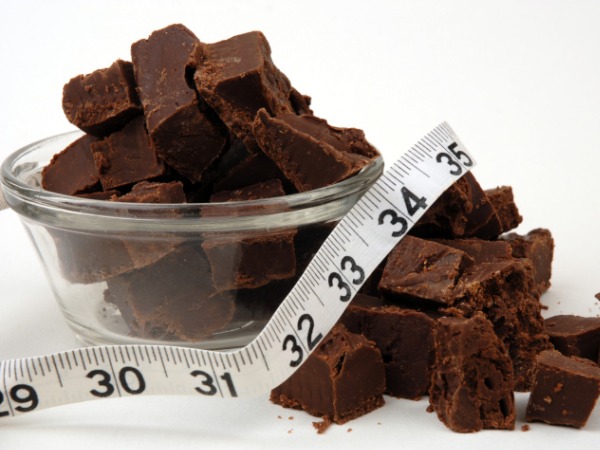A new study published in the Archives of International Medicine adds to the growing data supporting the benefits of dark chocolate in promoting weight loss. Of all the foods available on the planet, chocolate is perhaps the most enchanting (and enjoyable). This addictive food is deliciously made from the seeds of the cocoa tree, whose official name, Theobroma cacao, reflects the long and enduring love for chocolate (Theobroma is the Greek word for “food of the gods”).

Background:
A 2012 study published in the Archives of Internal Medicine showed that more frequent consumption of chocolate was associated with a lower body mass index (BMI) – the ratio of height and weight used to measure obesity. However, it is important to note that these benefits of chocolate only appeared with moderate consumption and that consuming large quantities of chocolate would be clearly counterproductive to weight loss. The recommended “dose” is about 30 to 60 g per day (about 1-2 ounces of a bar of chocolate that contains more than 70% cocoa).
Other key areas covered in the research on the benefits of consuming chocolate are its effects on cardiovascular disease and brain health. A growing body of recent research suggests that:
- Chocolate may be a rich source of flavonoid antioxidants that are especially important in protecting against damage to cholesterol and the lining of your arteries.
- Chocolate flavonoids prevent excessive platelet aggregation that may cause blood clots.
- Unlike the fats found in meat and dairy products, the saturated fats found in chocolate do not raise cholesterol levels.
- Frequent chocolate consumption is associated with a 40% lower risk of heart disease and a 30% lower risk of strokes.
- Chocolate can provide large amounts of arginine – an amino acid required in the production of nitric oxide. Nitric oxide helps regulate blood flow, inflammation and blood pressure.
- Chocolate may help improve cognitive function and memory as we age.
New data
In a new study from the Foundation for Diet and Health in Germany, men and women aged 19 to 67 were divided into three groups. One group of them was tasked with following a low-carb diet and consuming a daily 1.5-ounce serving of chocolate that contained 81 percent of cocoa (the chocolate group). Another group was assigned to follow the same low-carb diet as the chocolate group, but without the chocolate (the low-carb diet group). In addition, a third group ate as they pleased without restricting the type of food.
At the start and end of the one-month study, all participants were blood samples taken and their weight, body mass index, and waist-to-hip ratio measured and observed. During the study, the participants were encouraged to measure their weight daily and assess their ability to sleep as well as their psychological state.
The results showed that the participants in the chocolate introduction group were the most successful in losing their weight easily. This effect became noticeable in the statistics by the third week, when weight loss was 10% greater in the chocolate group. Additionally, the low-carb diet group experienced a rebound effect with an increase in weight in the last week of the study. In contrast, the chocolate group experienced a steady decrease in body weight. This is confirmed by evaluating a decrease in ketones in the body. Initially, the ketone decrease was significantly lower in the chocolate group than the low-carb counterpart, but after a few weeks the situation changed.
The improvements in cholesterol, triglyceride levels, and low-density lipoprotein (LDL) cholesterol were similar in the chocolate group and the low-carb diet group.
Using a detailed questionnaire assessing physical and mental symptoms, the chocolate group experienced significantly higher health improvements compared to the low-carb diet group. The chocolate group exhibited significantly fewer symptoms in terms of stress and heaviness.
The researchers concluded that consuming chocolate with a high cocoa content significantly increased the speed of weight loss and the success of weight loss regimens.




![The Top & Most Popular Seafood Bucket Restaurants in Dubai for you [Never Miss]](https://uae24x7.com/wp-content/uploads/2020/09/8-seafood-in-a-bucket-scaled-e1600739237403.jpg)
![Procedures for Renewing the Driving License in Abu Dhabi [3 Simple Steps]](https://uae24x7.com/wp-content/uploads/2020/07/Capture-9-e1595666454466.jpg)





